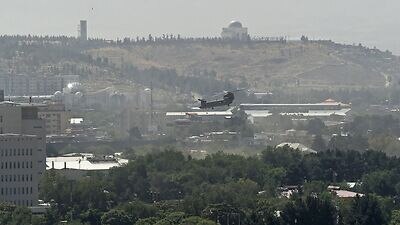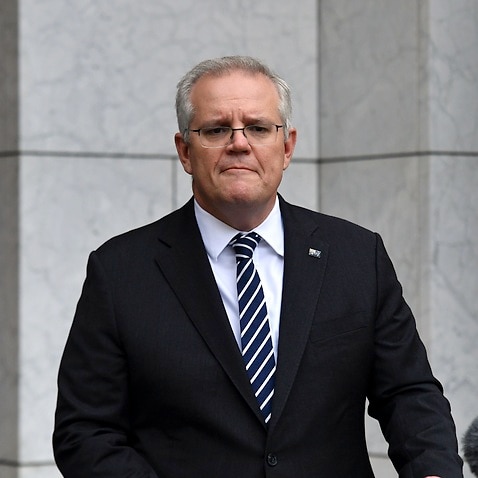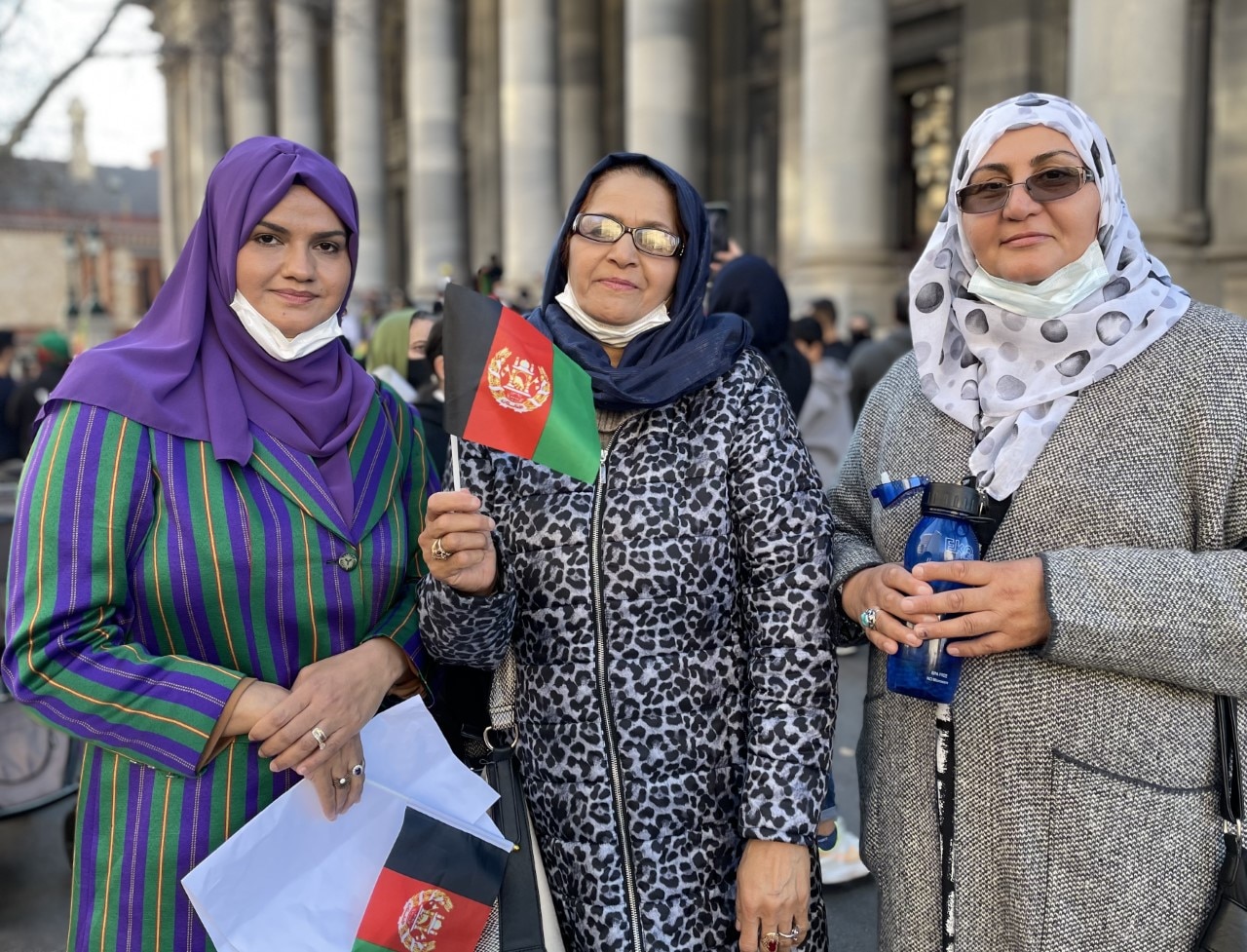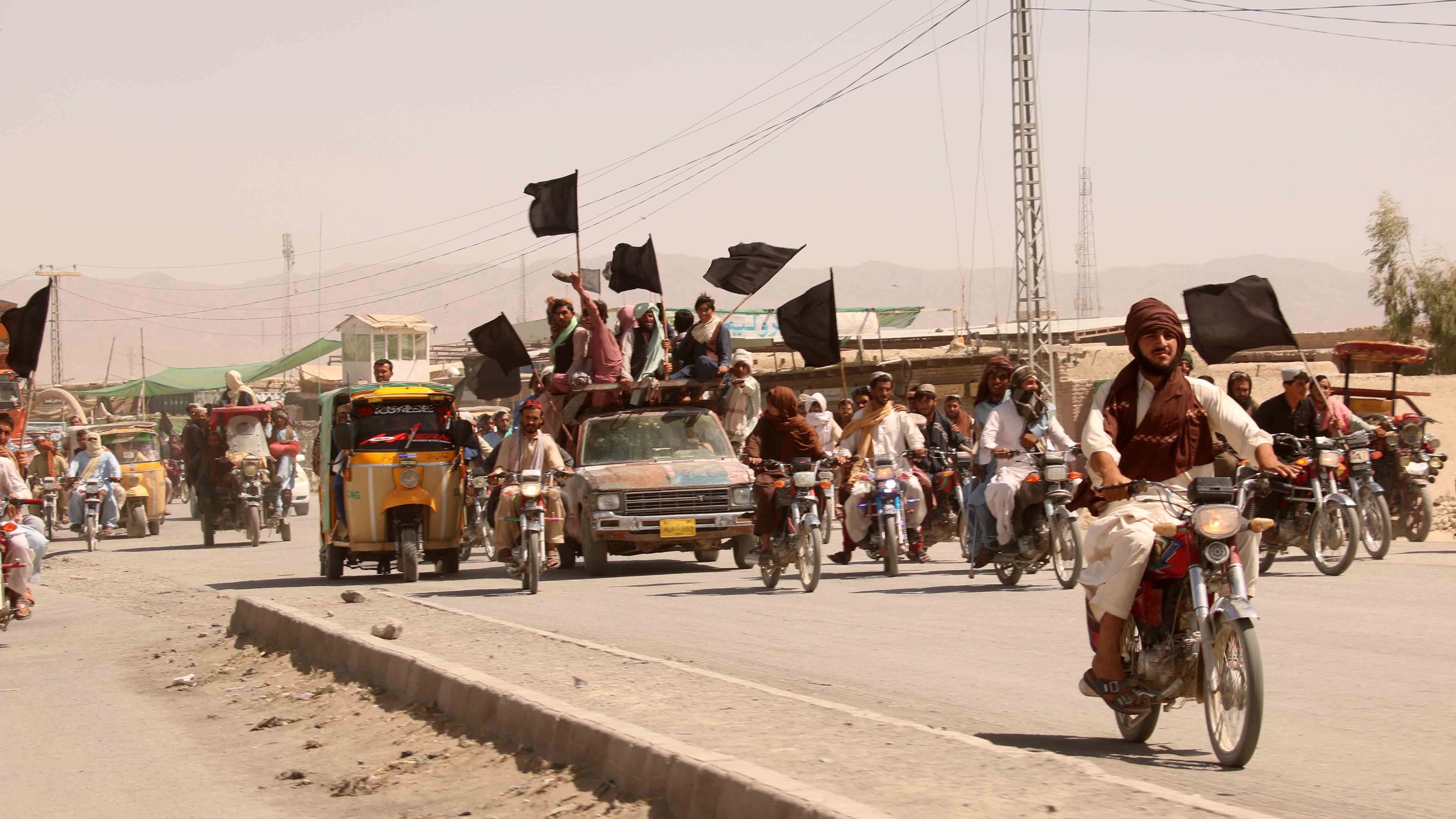
Taliban advance (Str/Xinhua)
On 8 July President Joe Biden was questioned at a press conference about the assessment of his own intelligence experts that the Afghan government would most likely collapse. Biden denied it outright. Yet just a few weeks later the Taliban has taken 20 of the 34 provincial capitals including Kandahar and Mazar-i-Sharif. On Friday it was thought that it could conquer Kabul in a couple of months. Now, on Sunday, the Taliban are on the outskirts of the capital. President Ashraf Ghani is reported to have fled Kabul, apparently for Tajikistan. After over $1 trillion spent by the US and the loss of more than 2,400 American and 450 British service personnel, many are questioning what this loss of blood and treasure was for.
The withdrawal of US troops was agreed in principle last year by the then US President, Donald Trump, after talks with the Taliban at Doha, in which assurances were given that it would no longer provide a safe haven for terrorists. That decision is now being implemented by his successor Joe Biden, much to the chagrin of his political supporters and opponents alike. Condemnation has come thick and fast. Tom Tugendhat and Tobias Ellwood, who chair the Foreign Affairs and Defence select committees respectively and are both former army officers, lament that the US has made an egregious strategic error by vacating the field. Ben Wallace, the Defence Secretary, has openly stated that that he does not agree with the US decision and that a redeployment of troops could be required to prevent the country becoming a breeding ground for terrorism, a proposition which has been firmly rejected by Downing Street. The reality of the UK ’ s military impotence without the umbrella of American military support is stark.
The fundamental question is, however, not whether the US was right to pull out its forces after 20 years, but why it did not do so a decade ago. The Bush administration ’ s initial rationale for the invasion of Afghanistan was clear, in marked contrast to the premise offered for the scandalous misadventure in Iraq. After 9/11, the worst atrocity committed on US territory since the Japanese attack on Pearl Harbour in 1941, which resulted in almost 3,000 civilians being killed, the US was not simply going sit on its
It demanded that Osama bin Laden, the head of al-Qaeda, who masterminded the attack on the Twin Towers and was being sheltered by the Taliban in Afghanistan, be handed over. The Taliban — who are ethnically Pashtun and adhere to a strict code of honour in which the hospitality and the protection of guests is sacrosanct and to be paid for with one’s life if necessary — refused to give him up. The US invaded, principally with the support of its key ally the UK, and toppled the Taliban government in short order. It was in May 2011, in an operation authorised by the then President Barack Obama, that bin Laden was found to be hiding in a house in the northern Pakistani town of Abbottabad and killed by US Special Forces. That would have been the optimal time to exit Afghanistan, with the core aim of the mission accomplished.
But hubris is seductive and the Americans succumbed to it. It is with good reason that Afghanistan, which has been the epicentre of great power struggles for centuries, is known as the “ graveyard of empires”. It was a source of tension between the Russian and British empires in the nineteenth century and of Soviet interference for a decade from 1979, during which period it became a frontier in a proxy war between the two superpowers. The Soviet occupation was resisted by the Mujahideen, including one Osama bin Laden, w ho were covertly funded and supported by the Pakistani intelligence service, the ISI, which in turn received funds from the CIA in line with the Reagan doctrine to subvert Russian influence. The USSR incursion failed and within a couple of years of their departure the puppet regime of Mohammad Najibullah was deposed.
F ar from heeding the lessons from the Soviet humiliation, the US under George Bush engaged in mission creep, with the goal expanded to democratise and reform Afghanistan. This certainly provided security to Afghans and increased education and work opportunities for young girls and women. But the domino-like fall of successive provincial capitals shows that the enterprise of establishing an alternative government was built on sand and has highlighted once again that state-building by outside powers is a fool ’ s errand. Change within a warlord-riven country like Afghanistan, where combat is ingrained, has to be organic. When Biden says that the Afghans must fight for the future of their own country, he is right.
Unfortunately they have not been well-served by the government of Ashraf Ghani, which is notoriously corrupt and has failed to pay swathes of police and army officers for months. Many of them are stationed away from their families in locations they have no affiliation to and faced with a fearsome Taliban have opted to throw in the towel. I met Ghani in 2005 over an elaborate dinner at a UNESCO World Heritage Site on the outskirts of Lisbon. The Columbia University-educated Professor of Anthropology and former World Banker was engaging and thoughtful. But while adept at charming international donors at Davos, he lacks credibility with his own people. His pronouncement on Saturday that remobilising the Afghan National Security forces was a “ top priority” was laughable. The view of the Afghan owner of my local pizza takeaway in East London, who fears for his family and friends on the ground in his erstwhile homeland, is that President Ghani will have already negotiated his own route to exile.
While the US and UK are hastily sending in forces to help evacuate their consular staff and other nationals, given the gravity of the situation, there remains no appetite on the part of American and British electorates for a prolonged presence in the country. Several Western commentators and politicians, including the former Foreign Secretary, William Hague, and the former International Development Secretary, Rory Stewart, fret about the message it sends potential allies about the West ’ s commitment to its purported interests. In an era of great power competition between the US and China in which the West will need regional supporters in Asia, there is consternation over the reliability of US support.
But this is irrelevant, as the US ’ lack of commitment to its foreign policy pursuits is already priced in. When Pakistan ’ s President General Pervez Musharraf, who himself assumed power in a coup, visited London after the US invasion in 2001, he told me directly that Pakistan was stuck between a rock and a hard place and had no choice but to support the US-led invasion. But he was also unequivocal that Pakistan would extract as much bounty from the Americans as possible before “ they ditch us again”, a reference to the hasty evaporation of support for Pakistan once the Soviets pulled out of Afghanistan in 1989.
So the US decision is pragmatic and to many of those observing it the message will be a confirmation of what they already know. If you live in a dangerous neighbourhood, you had better pursue a realist foreign policy based on self-interest and a recognition that ultimately you are on your own. The real tragedy is that the people of Afghanistan, who have enjoyed relative peace for two decades, will now be displaced from their homes and have to once again live under a tyrannical and brutal regime that claims to be guided by Islamic theology. Interesting, then, that when the Taliban regime was previously in power, it obtained a significant chunk of its revenue from the taxation of opium, hardly a practice compatible with the religion they claim to follow.
The tragic future of Afghanistan may be that it once again becomes a centre for regional power struggles to be played out by those in relentless pursuit of their own interests including Russia, Iran, China and Pakistan. Provided the Taliban, which craves international recognition, does not provide a breeding ground for terrorists the West will consider its job done. It will be the people of Afghanistan that will have to fight for a more hopeful future. It will be a gruelling, bloody and unenviable task.

The United States started evacuating its diplomats and was sending more troops to help secure Kabul airport and the embassy. Source: AFP
Biden Braces for a Brutal Loss
“The Biden administration is preparing for the fall of Kabul and a retreat from any U.S. diplomatic presence in Afghanistan — a stunning reversal of expectations,” Axios reports.
“It’s looking increasingly likely to high-ranking aides to President Biden that the U.S. will have no enduring diplomatic presence in Afghanistan beyond Aug. 31 — the date Biden has promised the full troop withdrawal will be complete.”
“It’s a major reversal from even a few weeks ago.”
“The working assumption in Biden’s inner circle had been that Kabul could hold for the short term, allowing the U.S. to stay diplomatically engaged and help Afghan women secure their rights beyond the U.S. withdrawal.”
This article contains references to suicide.
Taliban insurgents entered the Afghanistan capital Kabul on Sunday, an interior ministry official said, as the United States evacuated diplomats from its embassy by helicopter.
The senior official told Reuters the Taliban were coming in "from all sides" but gave no further details.
A tweet from the Afghan Presidential palace account said firing had been heard at a number of points around Kabul but that security forces, in coordination with international partners, had control of the city

Australia is planning to expand its humanitarian intake for Afghan nationals
With the country's second and third-largest cities having fallen into Taliban hands, Kabul has effectively become the besieged, last stand for government forces who have offered little or no resistance elsewhere.
The United States started evacuating its diplomats and was sending more troops to help secure Kabul airport and the embassy after the Taliban's lightning advances brought the Islamist group to the door of the capital in a matter of days.
Heaving fighting was also reported around Mazar-i-Sharif, an isolated holdout in the north where warlord and former vice president Abdul Rashid Dostum had gathered his virulently anti-Taliban militia.
The only other cities of any significance not to be taken yet were Jalalabad, Gardez and Khost - Pashtun-dominated and unlikely to offer much resistance now.

As the Taliban's power grows, advocates for Australia's Afghan interpreters warn evacuations must happen now
President Joe Biden on Saturday doubled down on his decision to withdraw US forces from Afghanistan despite the Taliban's rapid advances, but pledged to send more troops to evacuate civilians and warned the insurgents not to threaten that mission.
After consultations with his national security team, Mr Biden said a total of "approximately 5,000" US soldiers - up from 3,000 - will now help organise evacuations and the end of the US mission after 20 years on the ground.
He warned the Taliban that any action "that puts US personnel or our mission at risk there, will be met with a swift and strong US military response".
Afghan President Ashraf Ghani pledged on Saturday not to let the "imposed war on people cause more deaths", and said consultations were taking place to try to help end the war, without offering details.
Earlier, US Central Command said more American military personnel had arrived in Kabul to ensure the safe evacuation of American embassy employees and Afghan civilians who worked for US forces.
The Pentagon estimates it will need to evacuate about 30,000 people before it completes its withdrawal from Afghanistan by 31 August, a deadline set by Mr Biden.
Mr Biden's decision to pull troops out of Afghanistan has come under increased scrutiny given the implosion of the country's armed forces, but he said he had no other choice - and laid some of the blame at the feet of Donald Trump.
"When I came to office, I inherited a deal cut by my predecessor... that left the Taliban in the strongest position militarily since 2001 and imposed a May 1, 2021, deadline on US forces," Mr Biden said.
"I faced a choice - follow through on the deal, with a brief extension to get our forces and our allies' forces out safely, or ramp up our presence and send more American troops to fight once again in another country's civil conflict," he added.
"I was the fourth president to preside over an American troop presence in Afghanistan - two Republicans, two Democrats. I would not, and will not, pass this war onto a fifth," Mr Biden said.
A host of European countries - including Britain, Germany, Denmark and Spain - all announced the withdrawal of personnel from their respective embassies on Friday.

Afghan woman Yalba Siddiqui (left) marched in Adelaide on Saturday
SBS News/Peta Doherty
On Saturday in Adelaide, hundreds of members of South Australia’s Afghan community rallied to condemn the Taliban and call for international action to halt the insurgents.
“What is happening [in Afghanistan] is horrible at the moment,” marcher Yalba Siddiqui told SBS News.
Ms Siddiqui’s husband is still in Kabul and waiting for an Australian visa.
“Day and night I worry about his safety,” she said.
“I would like the Australian government to do something and hear our voice.
'Crying day and night'
For Kabul residents and the tens of thousands who have sought refuge there in recent weeks, the overwhelming mood was one of confusion and fear.
Muzhda, 35, a single woman who arrived in the capital with her two sisters after fleeing nearby Parwan, said she was terrified for the future.
"I am crying day and night," she told the AFP news agency.
"I have turned down marriage proposals in the past ... If the Taliban come and force me to marry, I will commit suicide."

Taliban seizes major Afghan cities as the US readies for evacuations from the capital
UN Secretary-General Antonio Guterres said he was "deeply disturbed" by accounts of poor treatment of women in areas seized by the Taliban, who imposed an ultra-austere brand of Islam on Afghanistan during their 1996-2001 rule.
"It is particularly horrifying and heartbreaking to see reports of the hard-won rights of Afghan girls and women being ripped away," Mr Guterres said.
The scale and speed of the Taliban advance have shocked Afghans and the US-led alliance that poured billions into the country after toppling the Taliban in the wake of the September 11 attacks nearly 20 years ago.
Days before a final US withdrawal ordered by Mr Biden, individual Afghan soldiers, units and even whole divisions have surrendered - handing the insurgents even more vehicles and military hardware to fuel their lightning advance.
'No imminent threat'
Despite the frantic evacuation efforts, the Biden administration continues to insist that a complete Taliban takeover is not inevitable.
"Kabul is not right now in an imminent threat environment," Pentagon spokesman John Kirby said Friday, while acknowledging that Taliban fighters were "trying to isolate" the city.
The Taliban offensive has accelerated in recent days, with the capture of Herat in the north and, just hours later, the seizure of Kandahar - the group's spiritual heartland in the south.

The Taliban on Friday took control of Kandahar, Afghanistan’s second-biggest city.
AAP Image/EPA/AKHTER GULFAM
Kandahar resident Abdul Nafi told AFP the city was calm after government forces abandoned it for the sanctuary of military facilities outside, where they were negotiating terms of surrender.
"I came out this morning, I saw Taliban white flags in most squares of the city," he said.
Pro-Taliban social media accounts have boasted of the vast spoils of war captured by the insurgents - posting photos of armoured vehicles, heavy weapons, and even a drone seized from abandoned military bases.
With Peta Doherty.
15 Aug, 2021
AP
An Afghan official says troops have surrendered Bagram Airbase to the Taliban. The base is home to a prison housing 5,000 inmates.
Taliban fighters entered the outskirts of Kabul on Sunday as panicked workers fled government offices and helicopters began landing at the US Embassy in the Afghan capital, further tightening the militants' grip on the country.
Three Afghan officials told The Associated Press that the Taliban were in the districts of Kalakan, Qarabagh and Paghman in the capital.
The militants later pledged not to take Kabul "by force" as sporadic gunfire could be heard in the capital.
"No one's life, property and dignity will be harmed and the lives of the citizens of Kabul will not be at risk," the Taliban said.
/cloudfront-ap-southeast-2.images.arcpublishing.com/nzme/2IMEXYO33NCQC5TU4V5JYJWTH4.jpg)
A Taliban spokesman said "we are awaiting a peaceful transfer of Kabul city", AP reported.
Taliban negotiators were heading to presidential palace to prepare for a "transfer" of power, AP reported.
Keep up to date with the day's biggest storiesSign up to our daily curated newsletter for the day's top stories straight to your inbox.
Please email me competitions, offers and other updates. You can stop these at any time.
SIGN UP
By signing up for this newsletter, you agree to NZME’s Terms of Use and Privacy Policy.
The insurgents issued the statement on Sunday as their fighters entered the outskirts of Kabul.
The militants themselves didn't acknowledge the advance, though they earlier took Jalalabad, near a major border crossing with Pakistan, the last major city other than Kabul not under their control.
In a nationwide offensive that has taken just over a week, the Taliban has defeated, co-opted or sent Afghan security forces fleeing from wide swathes of the country, even with some air support by the US military.
The rapid shuttle-run flights of Boeing CH-47 Chinook helicopters near the embassy began a few hours later as diplomatic armoured SUVs could be seen leaving the area around the post.
The US State Department did not immediately respond to questions about the movements.
However, wisps of smoke could be seen near the embassy's roof as diplomats urgently destroyed sensitive documents, according to two American military officials who spoke on condition of anonymity because they were not authorized to discuss the situation.
Sikorsky UH-60 Black Hawk helicopters, which typically carry armed troops, later landed near the embassy as well.
The Czech Republic also approved a plan to begin withdrawing their Afghan staff from their embassy after earlier taking their diplomats to Kabul International Airport.
/cloudfront-ap-southeast-2.images.arcpublishing.com/nzme/O5CSBGR4O4TOOA3ZXLPB4UDKG4.jpg)
President Ashraf Ghani, who spoke to the nation Saturday for the first time since the offensive began, appears increasingly isolated as well.
Warlords he negotiated with just days earlier have surrendered to the Taliban or fled, leaving Ghani without a military option. Ongoing negotiations in Qatar, the site of a Taliban office, also have failed to stop the insurgents' advance.
Thousands of civilians now live in parks and open spaces in Kabul itself, fearing the future. Some ATMs stopped distributing cash as hundreds gathered in front of private banks, trying to withdraw their life savings.
Gunfire erupted at one point, though the Afghan presidency sought to downplayed the shooting.
"The defense and security forces along with the international forces working for the security of Kabul city and the situation is under control," the presidency said amid the chaos.
Militants posted photos online early Sunday showing them in the governor's office in Jalalabad, the capital of Nangarhar province.
Abrarullah Murad, a lawmaker from the province told The Associated Press that the insurgents seized Jalalabad after elders negotiated the fall of the government there.
Murad said there was no fighting as the city surrendered.
/cloudfront-ap-southeast-2.images.arcpublishing.com/nzme/7RNOYJPPXFKBTSHYJAZHUK6TDA.jpg)
/cloudfront-ap-southeast-2.images.arcpublishing.com/nzme/K63HTH2EHHY4BVS4JWOUPVTREM.jpg)
The militants took also Maidan Shar, the capital of Maidan Wardak, on Sunday, only some 90km from Kabul, Afghan lawmaker Hamida Akbari and the Taliban said.
Another provincial capital in Khost fell later Sunday to the Taliban, said a provincial council member who spoke on condition of anonymity for fear of reprisals.
The fall on Saturday of Mazar-e-Sharif, the country's fourth largest city, which Afghan forces and two powerful former warlords had pledged to defend, handed the insurgents control over all of northern Afghanistan.
Atta Mohammad Noor and Abdul Rashid Dostum, two of the warlords Ghani tried to rally to his side days earlier, fled over the border into Uzbekistan on Saturday, said officials close to Dostum.
They spoke on condition of anonymity as they weren't authorised to publicly speak about his movements.
Writing on Twitter, Noor alleged a "conspiracy" aided the fall of the north to the Taliban, without elaborating.
"Despite our firm resistance, sadly, all the government and the Afghan security forces equipment were handed over to the Taliban as a result of a big organised and cowardly plot," Noor wrote.
"They had orchestrated the plot to trap Marshal Dostum and myself too, but they didn't succeed."
/cloudfront-ap-southeast-2.images.arcpublishing.com/nzme/WEJLSEVYTPAEWSZTC2LYWUZPUE.jpg)
In his speech on Saturday, Ghani vowed not to give up the "achievements" of the 20 years since the US-led invasion toppled the Taliban after the 9/11 attacks.
The US has continued holding peace talks between the government and the Taliban in Qatar this week, and the international community has warned that a Taliban government brought about by force would be shunned.
But the insurgents appear to have little interest in making concessions as they rack up victories on the battlefield.
"We have started consultations, inside the government with elders and political leaders, representatives of different levels of the community as well as our international allies," Ghani said.
"Soon the results will be shared with you," he added, without elaborating further.
Many Afghans fear a return to the Taliban's oppressive rule. The group had previously governed Afghanistan under a harsh version of Islamic law in which women were forbidden to work or attend school, and could not leave their homes without a male relative accompanying them.
/cloudfront-ap-southeast-2.images.arcpublishing.com/nzme/PUBNGTTG435AHTS47I7SUW5FTA.jpg)
Salima Mazari, one of the few female district governors in the country, expressed fears about a Taliban takeover on Saturday in an interview from Mazar-e-Sharif, before it fell.
"There will be no place for women," said Mazari, who governs a district of 36,000 people near the northern city. "In the provinces controlled by the Taliban, no women exist there anymore, not even in the cities. They are all imprisoned in their homes."
In a statement late Saturday, however, the Taliban insisted their fighters wouldn't enter people's homes or interfere with businesses. They also said they'd offer an "amnesty" to those who worked with the Afghan government or foreign forces.
"The Islamic Emirate once again assures all its citizens that it will, as always, protect their life, property and honour and create a peaceful and secure environment for its beloved nation," the militants said.
/cloudfront-ap-southeast-2.images.arcpublishing.com/nzme/3XUHDXND4KCIWDOJL5OTAM2KDU.jpg)
"In this regard, no one should worry about their life."
Despite the pledge, those who can afford a ticket have been flocking to Kabul International Airport, the only way out of the country as the Taliban took the last border crossing still held by the government Sunday at Torkham.
Pakistan's Interior Minister Sheikh Rashid Ahmed told local broadcaster Geo TV that Pakistan halted cross-border traffic there after the militants seized it.
The Taliban have taken control of Bagram Prison, located on Bagram air base, and set free the inmates, mostly Taliban fighters, who were imprisoned there.
Ashraf Wani New DelhiAugust 15, 2021

Taliban took control of a biggest US-controlled prison in Afghanistan. (Image: India Today)
The Taliban have taken control of Bagram Prison, located on Bagram air base, and set free the inmates, mostly Taliban fighters, who were imprisoned there.
The Bagram air base, which used to be the largest US military base in the country, is now under the Taliban's control.
The Bagram Prison was controlled by the US forces who were stationed in Afghanistan. Following the decision to withdraw American troops from the country, control of the prison was passed on to the Afghan Armed Forces on July 1.
Afghan forces at Bagram air base, home to a prison housing 5,000 inmates, surrendered to the Taliban, according to Bagram district chief Darwaish Raufi. The prison at the former US base held both Taliban and Islamic State group fighters, news agency AP reported.
In a nationwide offensive that has taken just over a week, the Taliban have defeated, co-opted or sent Afghan security forces fleeing from wide swaths of the country, even though they had some air support from the U.S. military.
On Sunday, they reached Kabul. Three Afghan officials told The Associated Press that the Taliban were in the districts of Kalakan, Qarabagh and Paghman in the capital and awaiting a “peaceful transfer” of the city after promising not to take it by force.
Taliban spokesman Suhail Shaheen told Qatar’s Al-Jazeera English satellite news channel that the insurgents were in the process of negotiating with the government.
READ: Taliban, Afghan govt in talks for 'peaceful transition of power' | Top developments
But when pressed on what kind of agreement the Taliban wanted, Shaheen acknowledged that they were seeking an unconditional surrender by the central government.
Taliban negotiators headed to the presidential palace Sunday to discuss the transfer, said an Afghan official who spoke on condition of anonymity for fear of reprisals. It remained unclear when that transfer would take place.
(With inputs from AP)
VIDEOS show Taliban fighters lounging in luxurious ex-home of US-backed warlord as pundits blame grift for collapse of Afghan army

In videos resembling an episode of MTV’s iconic house tour program ‘Cribs’, Taliban fighters can be seen lounging in the ostentatious interior of former vice president Dostum’s residence in Mazar-i-Sharif. The northern city was captured by the militants on Saturday, after government forces there allegedly surrendered shortly after fighting broke out.
Dostum, a seasoned warlord who aligned himself with the US-backed Northern Alliance during the 2001 invasion of Afghanistan, had vowed to defend Mazar-i-Sharif from the Taliban onslaught. But he reportedly fled the city after government forces handed over their weapons and equipment to the Taliban as part of a “cowardly plot,” Atta Mohammad Noor, the former governor of Balkh province, told the media. Noor, who was commanding local militiamen when the city’s defenses collapsed, said both he and Dostum had escaped and were safe.
However, what Dostum left behind has both amused and angered social media observers. Footage shows cross-legged militants relaxing in overstuffed armchairs as others admire the mansion’s glitzy decor. One clip shows them examining what appears to be a gold tea set.
The videos represent a “searing propaganda victory” for the Taliban, one pundit argued, noting that Dostum was a “near-mythic” figure who had once controlled vast swathes of Afghanistan.
Others expressed dismay that the Taliban fighters had enjoyed a “tea party” in a “castle” allegedly built using US tax dollars.
“Whilst General Dostum lived in opulence, many of his soldiers went unpaid. One of the reasons for the army’s collapse,” British politician and former soldier Henry Bolton complained.
Political pundit and MSNBC host Mehdi Hasan said the footage served as a reminder that the “corrupt warlords we allied with in Afghanistan all these years have been pretty awful.”
During his years of cooperation with the United States, Dostum has faced repeated accusations of corruption and human rights abuses. He spent part of 2018 in exile, following accusations that he had ordered a political opponent to be sexually assaulted.
The Taliban didn’t linger long in Dostum’s sumptuous lodgings, however, beginning an assault on Kabul on Sunday.
No comments:
Post a Comment